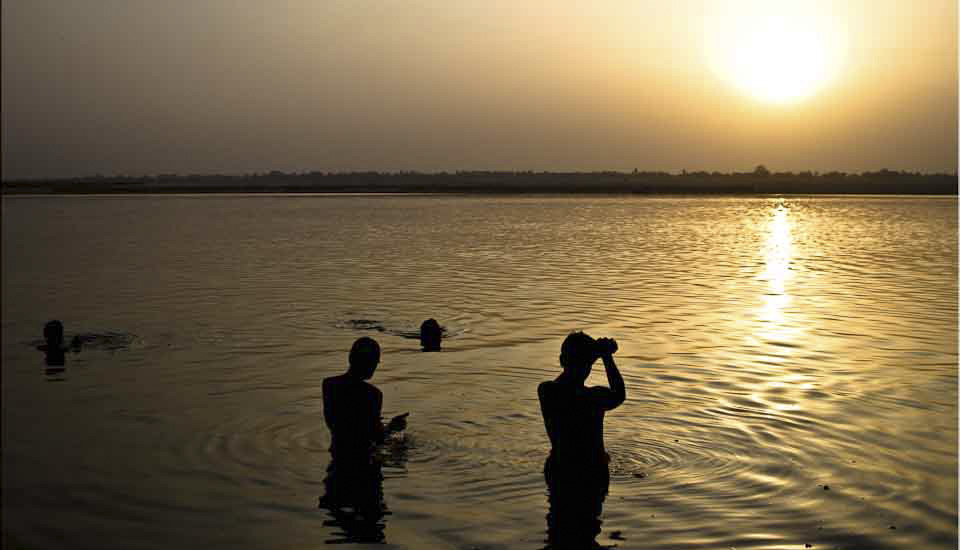.jpg)
Mosque of Hassan II – Casablanca
The second largest functioning mosque in Africa sits on a 9-hectare (22-acre) complex overlooking the Atlantic Ocean. Indoors and out, it can house 105,000 worshippers. Our small group was getting a limited early-morning guided-tour between prayers.
It was still cool and dim when we loaded our suitcases onto a small bus: the pre-dawn light was too low for me to get much of an impression of Casablanca, that fabled North African city that lends its name to gin-joints, stories, and popular imagination.
I had arrived in the city early-evening the day before, coming off a train from Marrakech. Before that, I’d spent a few days walking in Morocco’s High Atlas Mountains (see: Over the Tizi Oudid). I barely had time for a quick shower before meeting the small group with whom I was going to be touring the rest of the country (Premium Morocco in Depth). The light was already falling when we set off for a traditional dinner in a charming restaurant nestled into an old fort.
Our one stop in Casablanca the next morning – once our bags were packed and stowed onto the bus for the trip to Meknes by way of Rabat – was at the massive Mosque of Hassan II. Built under the guidance of King Hassan II (r. 1961-1999), this huge complex – completed in 1993 – sits partly on land and partly over the sea.
I’ve visited a number of mosques over the years – particularly in India, Oman, and Türkiye – but in Morocco, non-Muslims are generally excluded. The Hassan II Mosque is the exception, allowing visitors outside of prayer times. We met with our guide on the expansive plaza around 8am, and set off to learn about the history and the architecture of this massive structure.
Religious Islamic art is typically characterized by the absence of figures, and by the extensive use of decorative calligraphy and abstract geometric and floral patterns. It was the strong geometrics: the lines, the curves, and the repeated patterns, that stood out for me in this particular mosque.
Come have a look.
.jpg)
The Courtyard
It’s a long walk from the street (Bd Sidi Mohammed Ben Abdallah) and across the courtyard in the 9-hectare (22-acre) complex to the mosque itself.
.jpg)
Arches Everywhere
Repeated arches balance the 210-metre (690-foot) tall minaret, which was the tallest in the world when it was completed in 1993.

Minaret on the Mosque
Moroccan minarets are historically square. This one is intricately decorated with a pattern in chrome and green and blue tiles – the colours of which are said to represent the surrounding sea and God above.

Decorated Ceiling
Our first indoor stop was in the small museum, where there are many examples of the materials and techniques used by the 10,000 artists and craftsmen who participated in building and beautifying of the mosque. Ridged ceilings like this help baffle noise.

Decorated Cornice
This type of woodwork – dating to the 9th century and typically made of cedar – involves carefully chiselled carving and detailed paintwork.

Decorated Walls
Repeated patterns are everywhere. Note the decorative holes above head level which aid air circulation.

More Arches

Main Hall
The size of the main prayer hall defies comprehension: it has the capacity to accommodate 25,000 devotees. The floor is heated, and the massive roof high overhead is retractable, allowing for daytime sunlight and stars on a clear night. Speakers are hidden in the decorations on some of the columns.

Carved Details

Our Guide
We are given a brief introduction to the history of Islam in Morocco. (iPhone15Pro)

Scalloped Arches
With the exception of some Italian white granite columns and the 56 glass chandeliers from Murano, Italy, all of the materials used in the construction of the mosque were sourced locally.

Door Detail : Light Radiating from the Sun

Like a Mace
Ornate candelabras – probably of oxidized copper or brass – hang all around.

Lines and Curves and Pillars
The Wudu area, where the faithful perform their pre-prayer ablutions, is a symphony of curves. The hall is in the basement, and is accessed from outside the mosque. It houses a total of 600 taps scattered around the 45 marble fountains: which represent lotus flowers – but make me think of mushrooms.

Intricate Sconce

Cogs in the Works
Featuring traditional Moroccan motifs, many of the electrically-operated doors are made of titanium to withstand oceanic forces.

Portrait of a Guide

Outside the Entrance Doors

The City and the Sea Beyond
The sky has lightened, and we can now see the beach and the city beyond.

In the Courtyard – More Patterned Arches

Fountain
Beautiful Arabesque mosaics decorate the 41 fountains around the courtyard.

The Minaret against a Blue Sky
After an almost two-hour visit, we take one last look at the minaret and leave the Hassan II Mosque behind. (iPhone15Pro)

Fascinating place.
I’ll have to return one day to get a sense of the city itself …
“Here’s looking at you, kid!”
Pictures: 14October2024



























